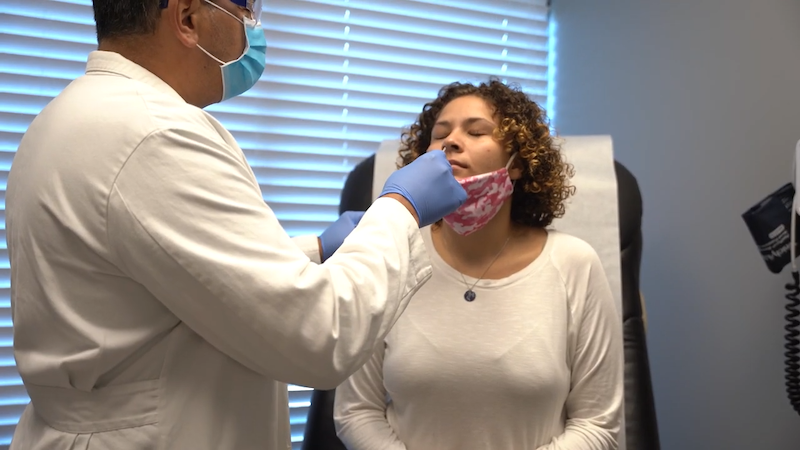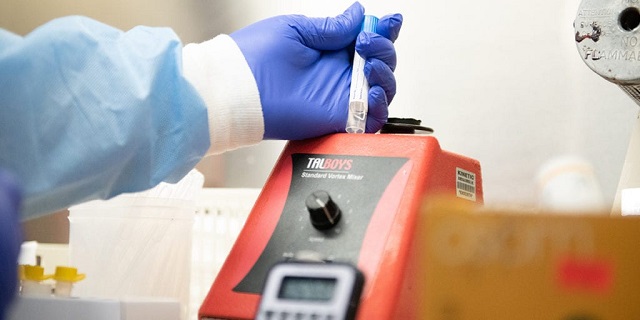How to Prepare for a COVID Test

January 05, 2021
To ensure that you get an appointment for a COVID-19 test, make phone calls or search online before driving anywhere. Some locations require people to have appointments or prescriptions; others accept walk-ins. A bit of preliminary research will save you the frustration of being turned away when you show up at a testing site.
How to find a COVID-19 testing site
Call your primary care doctor’s office to find out if they recommend a specific testing site in your area. You can also search online for testing sites, then call specific locations, if phone numbers are listed. Some testing sites don’t share their phone numbers and require people to sign up for appointments online.
In New Jersey, places where you may get a COVID-19 test include:
- public testing sites, including drive-thru locations
- urgent care facilities
- local retail pharmacies, including CVS, Rite Aid and Walgreens
- How to prepare for your COVID-19 test
Two things that have never factored into health care visits before may influence your COVID-19 testing experience. Before you go:
- fully charge your cell phone
- get a full tank of gas
“Many testing locations need to call patients to give them instructions once they arrive for their test, so it’s important to have a charged phone,” says Michael Rothberg, M.D. lead physician at 5 Hackensack Meridian Urgent Care Centers. “[Also], you may be tested in your vehicle or asked to wait in your vehicle until it’s your turn. Make sure you’ve filled your gas tank, especially during the winter months.”
What to bring to your COVID-19 test
When you go for a COVID-19 test, there are a few things that you should take to the appointment:
- a mask
- your driver’s license or other identification
- your health insurance information
- a prescription or referral, if it’s required by the testing site
- water and snacks, if you expect to be in your car for a while
- any medication that you may need
- a book, or something to keep yourself busy
- something to keep your child busy, if they’re getting tested
- a phone charger
Things to avoid doing when seeking a COVID-19 test
When you go for a COVID-19 test, you should not:
- bring along anyone who isn’t getting tested, including children, if possible
- get tested too soon; experts suggest waiting five days after COVID-19 exposure to get tested
- seek testing at a hospital emergency room
“Only head to the emergency room if you have tested positive for COVID-19 or suspect you have it and are experiencing difficulty breathing, persistent chest pain and a bluish tint to your lips or face,” says Dr. Rothberg.
Other considerations when getting a COVID-19 test
Write down any information that’s shared during your appointment. Since some of the sites are “pop-up” testing sites, it may be difficult or impossible to contact them after you had your test. Make sure to find out how and when you’ll get test results before leaving.
“Demand is high and wait times are long at many testing locations,” says Dr. Rothberg. “The heroes working in testing centers are doing their best to test everyone in a timely matter. Be patient, kind and remember to extend grace and humanity; we are all in this together.”
If you receive a possible result and have questions about your care, call your primary care physician.
The material provided through HealthU is intended to be used as general information only and should not replace the advice of your physician. Always consult your physician for individual care.
Find a doctor near me
COVID-19 Antibody Testing: Pros & Cons

COVID-19 Antibody Testing: Learn pros & cons. Understand your risk. Get tested at nearby Urgent Care. Call 800-822-8905 to schedule.
Should You Wear a Mask Outside?

Should You Wear a Mask Outside? Dr. Frank explains when masks are needed in New Jersey and offers guidance on COVID-19 safety. Learn more & schedule an appointment.
Find a doctor near me

What Makes a Child Tic?
Understand child tics? Dr. Khrizman explains causes, management, and when to seek help. Learn more and find support.

Reduce Your Fear of Needles
A fear of needles can seem debilitating. Here are some tips to help overcome the phobia.

How to Properly Wear a Facemask
Learn proper facemask use. Protect yourself and others. Simple instructions for wearing, cleaning, and preventing fogging. Improve your safety today.

What Can You Do After You’re Fully Vaccinated Against COVID?
There are advantages to getting fully vaccinated against COVID-19.
